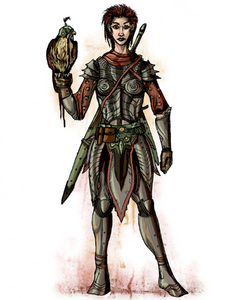Human
| Human | |
|---|---|
 A human. | |
| Population | approx. 50000 |
| Distribution | All across Sapience |
| Strengths | Adaptable, quick learners, fast breeders, the majority nearly everywhere in Aetolia. |
| Weaknesses | Shorter lived than many of the other races, and often unable to attain the same expertise in other races' specialties. |
| A race of many-hued, many-featured bipeds that has grown to dominate the continent of Sapience. | |
Overview
The most common and proliferous of Aetolia's races, Humans can be found in all corners of Sapience, taking on all walks of life. Strong, weak, good, evil, warriors, scholars, priests and profane alike, Humans are the most diverse and varied of all the races, with their sole unifying trait being, perhaps, their remarkable spread and influence over the entire land - found in every city and guild, with a remarkable range of attitudes and traits, Humans have helped shape the history of the land from its earliest days and remain a strong influence in the modern age.
The race of Humans is adept at many things, but their true expertise is in their ability to adapt and grow. Where many races have settled in one or two areas alone, Humankind covers the realm with an equal influence. The cities are filled with the voices of Humans, and their hands have shaped society since the start of the Midnight Age.
Racial skills
Upon reaching certain levels, this race gains the following skills.
| Level | Name | Description |
|---|---|---|
| 1 | Improved Meditation |
|
| 25 | Improved Sleep |
|
| 50 | Selfishness |
|
| 75 | Blood Reserves |
|
| 100 | - |
|
Roleplay
A Human backstory can encompass nearly anything within Aetolia's lore - Human settlements can be found all across the land, from modest farming communities to remote villages to sprawling cities, giving a player a diverse range of choices when crafting a Human character. Similarly, there are no common personality traits or physical features, giving players a broad canvas to work with when making a Human.
The Origins of the Humans
As told by Meyrkar:
In the time of the great unknowing, we understood neither friendship nor trust, malice nor memory, and yet we understood danger. In the creaking darkness of night, in the tall cliffs, in the blue seas, and seemingly on every hillside, there was danger. Yet in each other, there was strength.
Even in this age of ignorance and instinct, we quickly learned the power of many against one. She who walks alone falls prey to the lion's jaws that much more quickly than he who breathes the same air as his kin. And so it was that many mortals came to travel in groups, usually no larger than a dozen. Each had its own leaders and subordinates, and its own purpose.
Some of the groups frolicked in the shadows of the hills, delighting in the bounty of the greener lands. Some of the groups hunted in the mountains, developing a taste for meat. Most lived as best they could on any nourishment at hand, with no preference more important than convenience. It is not known how long these packs roamed, but there was one dawn that changed all those that would follow.
With the rising of the sun came dim realization, even in the minds of the poor, nearly mindless mortals. They looked out from where they stood and realized all other groups stood with them. Together, upon one plain, thousands of groups had been gathered, through that force we call "coincidence" when we turn our eyes from the Divine. Together they stood, some groups hardly larger than a handful, others mighty herds, and they saw that they were different.
Some had travelled the high slopes of the north, and their skin had become pale and hair dark. Some had dined upon insects and fungus of the earth, and shied their tender blue eyes from the light. Some had grown leaner, their teeth proud and white and long, while others snuffled at the ground with wide noses and probing fingers.
They did not know each other, for each group had become accustomed to their own appearance. To each, all other groups appeared strange and utterly alien in form and behavior, and though they did not know of fear, they knew of danger. Each group shrank away from the others, suspecting the other "creatures" of attack or other, unpredictable hazards. And Varian, the Satus, looked upon the mortals and felt pity.
Speaking to them from the heavens, He said, "Though you are different, you are the same. Do not fear your brothers and sisters, for you are now Human, all. Many are the children you shall bear, in a great variation that is pleasing to Me."
When again they looked down from the firmament, they saw that they were indeed the same, yet different. The will of the Celestine swept through the plains upon which they stood, shaping their physique to the Human mold we know today. Though of many shapes and hues and postures, we knew each other not to be creatures. Each group left that plain without knowledge or understanding of what had happened, yet bearing a wordless sense of great fortune.